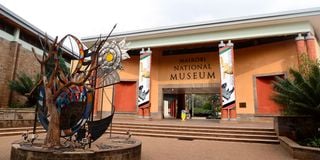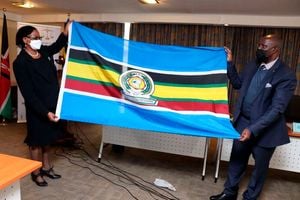
The National Museums of Kenya in Nairobi.
Last week, we were back for the Baraza Media Lab’s second Africa Media Festival, which was held in the open front yard of the National Museum and tents in its gardens.
Fifty per cent of the delegates were women. About 550 tickets that were available on sale were snapped up before the cut-off date, leaving many grumbling.
Folks from 23 countries picked from a menu ranging from presentations of the threats and fortunes of artificial intelligence (AI) were bringing to journalism to scary tales of the havoc “digital mercenaries” were wreaking with fake news and disinformation and tales of how to still make money in these hellish times for, especially, more traditional media.
There were many moments of laughter, with a good fellow from the Centre of Technology, in Bulawayo, presenting their cute news-reading bot called “Alice”. We heard that Zimbabwean men, probably drunk on the country’s popular beer, Zambezi, have not stopped sending “Alice” messages asking to take her out for a drink.
Beyond the jaw-jaw and demos, the festival was revealing for the peek into the political, social and transition realities of Kenya, and Africa, that it offered. It gave a glimpse into what an Africa run by women, and people between 25 and 40, could look like. You could throw a hat at those of us who were over 50.
Notably absent was a male authority figure delivering a keynote homily and yammering on until half the room dozed off. It offered an interesting peek into how they exercise and negotiate with power.
The closest it came to holding court solo for an older figure on stage was a short speech by the Dutch Ambassador, Maarten Brouwer, who pressed all the correct buttons about human rights and the beauty of freedom of media.
Time-consuming opening rituals
The audience listened politely, then slated him ruthlessly on social media for alleged hypocrisy; talking about human rights while his country stood firmly behind Israel as it killed children and smashed everything in sight in Palestine in its war with Hamas.
And, oh yes, Ethiopia’s Lilly Bekele-Piper had a ‘fireside’ chat on stage with my friend, teacher, writer, broadcaster and actor John Sibi-Okumu for her “Selam & Hello” podcast.
Sibi-Okumu was eloquent but extravagantly expansive in his remarks until a half-despairing Bekele-Piper threw her arms in the air and jokingly declared that she had failed to control him.
Also, mercifully, there were none of those time-consuming opening rituals, in which speakers acknowledge every VIP in the room, the organisers and, in case they miss a name, throw in the cliched catch-all ‘all protocols observed’.
It was refreshing to see speakers plunging into business on stage without first buttering everyone up or commenting on the weather.
If the elders had been in charge, several important people would have been given ‘due respect’ and the opportunity to impart their wisdom for at least 30 minutes each.
There was a lot of radical anti-colonial, anti-imperialist, pan-Africanist talk. The language was different though.
They hardly used words like imperialism but spoke critically of the “Western gaze”, and, instead of saying Africans should take back their power and societies, referred to “reclaiming spaces”.
Spoken word performances
Striking, unlike the wazee, who would have spoken about ‘international cooperation’, a shared humanity and such nice-sounding things, the young ones gave nods to ‘collaboration’ but were otherwise unapologetic about the necessity for “African narratives to be dominant”.
Outside, at one of the exhibition desks, copies of Debunk, a freshly minted quarterly magazine of “non-fiction and reportage”, was on sale.
It’s a quieter and more reflective version of the late Binyavanga Wainaina & Co’s defunct Kwani? These young folks are clever and sensitive to the times, and the future of Africa might not be in the hands of delinquents as the older folks often claim.
And there were spoken word performances, and music, lots of it, on the last evening of the proceedings. Somebody like me — whose main music fare remains jazz by John Coltrane and Miles Davis, the haunting crooning of Nina Simone, still plays Them Mushrooms in nostalgic moments and tips the hat to men like Aaron Rimbui — was hopelessly lost in the woods.
The atmosphere started getting heated when Coster Ojwang came on. He’s something, Ojwang; he has a stage band, a beauty most musicians no longer have. Shame, I had never heard of him, proof that I am a caveman in these matters. Fellows jumped to their feet and were soon gyrating to his sounds.
But the MC had been talking up Okello Max, who, I was told, is a heartthrob. Truly tall, dark and handsome, Okello took to the stage in a bright red suit with gold-coloured buttons. Before long, the ladies were swooning at the edge of the stage.
I thought that if this had been August 2022, the revellers would have gone on to vote for the cool, bearded, legalise-marijuana presidential candidate George Wajackoyah at the end of Ojwang’s performance.
By the time Okello closed, many of them were feeling so buoyant they would have stood as presidential candidates. Not how I imagined a night at the museum would go.
Mr Onyango-Obbo is a journalist, writer and curator of the "Wall of Great Africans". @cobbo3










